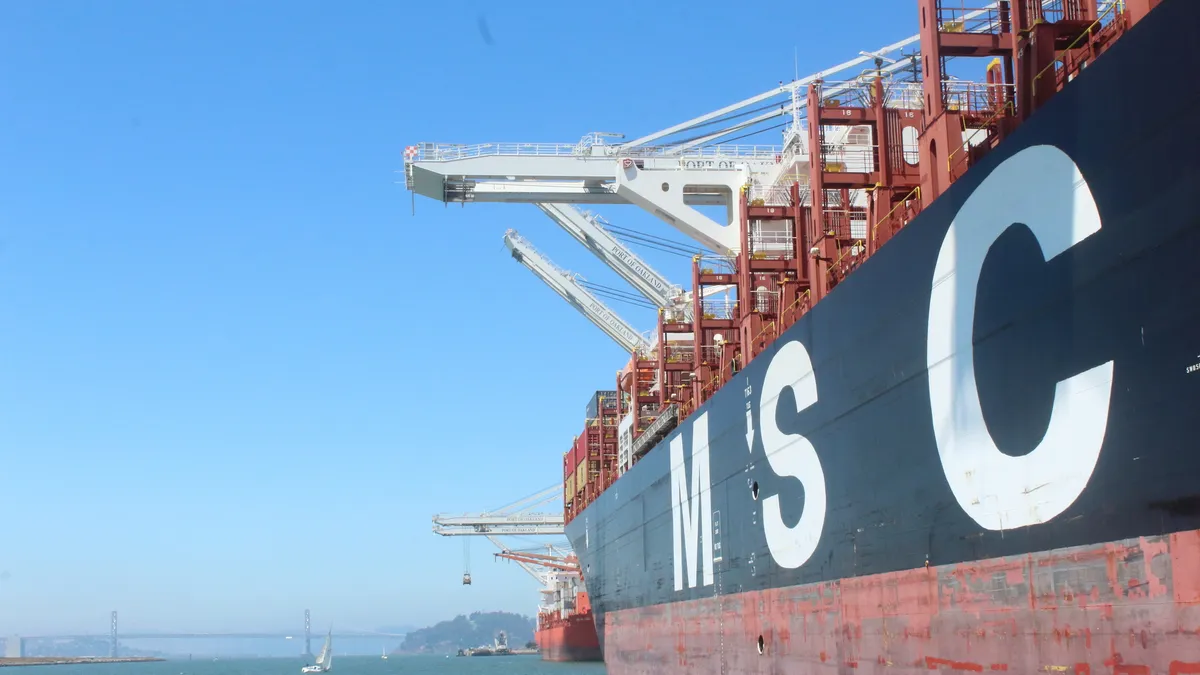UPDATE: Oct. 15, 2020: CMA CGM and MSC have completed their integration process with the TradeLens platform after signing on in May 2019. The process required "considerable investment in new API capabilities" and a "15-customer pilot involving more than 3,000 unique consignments, 100,000 events and 6,000 containers to ensure the TradeLens platform distributes and shares shipment data across various supply chains with speed and accuracy," according to the Thursday announcement.
“By completing the integration, we can now begin showing our customers and business partners how they can create and see value from the platform,” said Andre Simha, global chief digital and information officer for MSC.
Hapag Lloyd and ONE, which signed on in July 2019, are still working to complete the same integration process, according to a spokesperson.
TradeLens now includes more than 10 ocean carriers and incorporates data from 600 ports and terminals capturing nearly half of global ocean freight, according to the statement.
Dive Brief:
- CMA CGM and MSC have joined A.P. Moller - Maersk and IBM's blockchain-based digital shipping platform TradeLens, bringing the effort's carrier count to six. Besides founding carrier Maersk, CMA CGM and MSC are the largest carriers to join the effort to date. ZIM, PIL and Seaboard Marine are also signed on. The number of industry participants, including and beyond ocean carriers, is now more than 100, according to a press release emailed to Supply Chain Dive.
- The platform is now processing "over ten million discrete shipping events and thousands of documents each week, providing shippers, carriers, freight forwarders, customs officials, port authorities, inland transportation providers, and others a common view of transactions," according to the release.
- With this announcement, CMA CGM has become the first carrier to participate in TradeLens and the other major ocean shipping blockchain initiative, the Global Shipping Business Network (GSBN). With the additions of CMA CGM and MSC, TradeLens has more than doubled its TEU count, overtaking its counterpart GSBN.
| TradeLens | Global Shipping Business Network | ||
|---|---|---|---|
| Carrier | TEUs | Carrier | TEUs |
| Maersk | 4,146,352 | COSCO | 2,897,915 |
| MSC | 3,364,696 | CMA CGM | 2,678,802 |
| CMA CGM | 2,678,802 | Evergreen | 1,282,414 |
| PIL | 394,495 | Yang Ming | 643,180 |
| ZIM | 298,802 | ||
| Seaboard Marine | 38,144 | ||
| Total | 10,921,291 | 7,502,311 |
Dive Insight:
CMA CGM, with eggs in both blockchain ocean shipping baskets, seems enthusiastic about the potential of a blockchain-backed traceability technology in the industry.
"Digitization is a cornerstone of the CMA CGM Group’s strategy to provide an end-to-end offer tailored to our customers’ needs. We believe that TradeLens, with its commitment to open standards and open governance, is a key platform to help usher in this digital transformation," said Rajesh Krishnamurthy, Executive Vice President, IT & Transformations, CMA CGM Group in a statement. "TradeLens’ network is already showing that participants from across the supply chain ecosystem can derive significant value."
But why back both solutions when they have nearly identical objectives?
It could be that for ocean lines and shippers, it doesn't much matter which platform is in use as long as both provide the possibility of step-by-step visibility and greater efficiency. A TradeLens spokesperson told Supply Chain Dive TradeLens aims to be a neutral network with open APIs for developers to use to build their own tools. CMA CGM announced last week it will add 50,000 digital trackers to its fleet to provide shippers who request these containers a real-time view of their freight.
Using IoT technology to link the physical shipments with a burgeoning digital infrastructure is a key element in bringing these solutions to life. And so is developing digital standards so shippers can work with multiple carriers seamlessly. For this task, ocean lines have formed the Digital Container Shipping Association (DCSA), which has more carriers signed on than either blockchain effort.
"The TradeLens platform has enormous potential to spur the industry to digitize the supply chain and build collaboration around common standards," said André Simha, Chief Digital & Information Officer, MSC. "We think that the TradeLens Advisory Board, as well as standards bodies such as the Digital Container Shipping Association, will help accelerate that effort."
No matter which platform ends up winning out in the end, if indeed there must be one winner, today's news is a clear signal that the major ocean shipping players are on board with digitization efforts, and more specifically with the benefits of blockchain infrastructure.
The only carriers within the top 10 lines ranked by TEUs not publicly signed on to a blockchain initiative are Hapag-Lloyd, ONE and Hyundai Merchant Marine — all three of which are members of the DCSA.














